|

Resveratrol
The Fountain of Youth
and the explanation for the French Paradox?

Paul May
Bristol University, UK

Molecule of the Month - July 2016.
Also available: HTML version.

|
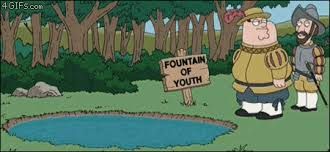
Peter Griffin from Family Guy finds the mythical Fountain of Youth.
|
It sounds like a molecule that makes things go backwards…
Not reverse-atrol. The name comes from the fact it is a derivative of the medical antiseptic resorcinol that had been obtained from corn lilies (Veratrum grandiflorum). It’s found in many plants, especially the skins of some berries and grapes, and is produced when the plant is injured, exposed to UV light or attacked by bacteria or fungi. But in a way resveratrol may make things go backward – or at least slow down…
How do you mean?
In 1992, Drs Evan Sieman from Rice University and Leroy Creasy from Cornell reported that they had found the trans-isomer of resveratrol (trans-RV) in red wine, and suggested that this might be the reason for the ‘French Paradox’.
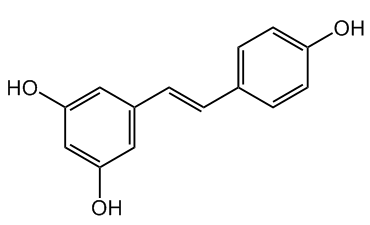 |
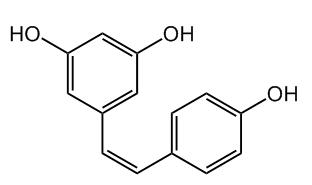 |
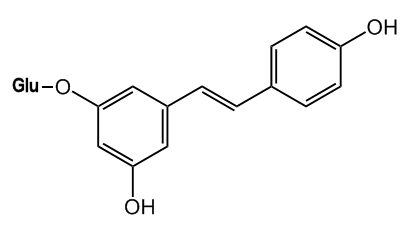 |
trans-resveratrol | cis-resveratrol | trans-piceid |
|
|
|
Resveratrol is found as cis and trans isomers, with the trans one being the more potent. Often it is found as a glucoside (i.e. bonded to a glucose molecule (Glu) via one of the OH groups), in which case it is called cis- and trans-piceid, respectively.
What’s that?
Doctors had long been puzzled by the fact that the French lead seemingly unhealthy lifestyles; they smoke a lot, they drink wine every day, and eat food that is relatively high in unsaturated fat (meat, cheese, etc.) – all factors which are normally implicated in coronary heart disease. Yet surprisingly the French have a relatively low rate of heart disease, and scientists can’t explain this paradox.
So was it the wine?
Well, that was the suggestion. Perhaps something in the red wine, that the French drank at (almost) every meal, was protecting their hearts from the excesses of the rest of their lifestyle, and resveratrol looked the likely candidate.
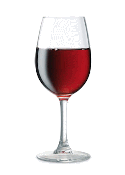
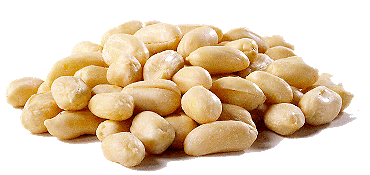
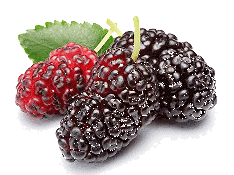
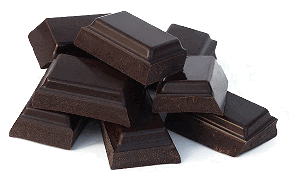
Various foodstuffs that are high in resveratrol, include red wine, peanuts, mulberries, and dark chocolate.
Why did they think that?
Because of circumstantial evidence from other experiments. Scientists studying the lifespans of various organisms, from simple ones like yeast and worms, to more complex ones like flies, fish, rats, and even mice, had discovered that if they are not given enough calories (i.e. they are partially starved!), their lifetimes could be extended significantly. More detailed studies on yeast showed that calorie restriction stimulated the activity of a protein called the Silent mating-type information regulation protein (or Sir2 or sirtuin). Sirtuin proteins (of which there are several types) influence many cellular processes including aptosis (cell death) and aging. It appears that when sirtuin is activated, cells don’t die as quickly, and the organism lives longer.
So drinking red wine makes you live longer?
That was the suggestion – the resveratrol in red wine activated sirtuin, which then stimulated the immune system to protect the body against harmful products (smoke, alcohol, fat), increasing your lifespan – and this effect was especially noticeable if you drink a lot of red wine, like the French. Not surprisingly, the press went wild with this, and newspapers carried many excited stories about how we should all drink red wine daily, and eat other sources of resveratrol, such as red grapes, peanuts, mulberries, cocoa powder and dark chocolate. And very quickly a whole industry developed selling resveratrol food supplements to people willing to pay a lot of money for the promise of a longer life.

Various resveratrol dietary supplements are available which all claim to have health benefits, including prolonging lifepans - although there's no real evidence to back up any of these.
Was there any actual evidence for this?
At first things looked promising. In 2002, Dr David Sinclair of the Harvard Medical School and co-workers reported that giving trans-RV to yeast increased its lifespan by 70%. This also worked to some extent on worms, fruit flies and a species of fish, and it even seemed to have a measureable effect on mice.
Wow – does it work on humans too?
That’s the billion-dollar question. Unfortunately, despite many years of investigation and multiple studies, there is no evidence yet that consuming trans-RV increases the lifespan of humans. The problem is that resveratrol is metabolised very rapidly and efficiently by the human body, so it’s destroyed almost as fast as its ingested. This means that the concentrations of resveratrol required to stimulate sirtuin in humans are considerably higher than those that can be safely administered (or eaten!), and certainly much higher than the amounts available from red wine or from any supplements. The recommendations at the moment are that trans-RV supplements are not needed and are ineffective.
So there’s no Fountain of Youth?
That’s right. And it means we still don’t know the real reason behind the French Paradox, or if there is a paradox at all. It might just be that the way the French government collects and reports its death statistics are different to other countries, so we’re not comparing like with like.
Is that the end of resveratrol, then?
Not at all. There are still many studies going ahead to see if it has other benefits. There are reports that it
may have anti-cancer properties, may help with diabetes, and that it might help to regenerate brain cells and treat patients with Alzheimer’s. So watch this space…

References
- Wikipedia: Resveratrol, Sirtuin, David Sinclair, French Paradox
- Takaoka, M., J. Faculty Sci., Hokkaido Imp. Univ., 3(Ser. III), (1940) 1–16. (First report of resveratrol)
- Nonomura, S., Kanagawa, H. and Makimoto, A. Yakugaku Zasshi, 83, (1963) 988-990. (Resveratrol found in seaweed)
- Celotti E et al. J. Chromatogr A 730 (1996) 47-52. (Resveratrol content in grapes)
- Siemann, E. and Creasy, L. Am. J. Enol. Vitic., 43 (1992) 49–52. (Resveratrol in wine)
- Heilbronn, L.K. and Ravussin, E. Am. J. Clin. Nutr., 78 (2003) 361–369. (Calorie restriction and aging)
- Yamamoto H, Schoonjans K, Auwerx J, Mol. Endocrinol. 21 (2007) 1745–55 (Sirtuin in health and disease)
- Preyat N, Leo O. J. Leuk. Biol. 93 (2013), 669–680 (Sirtuin link between metabolism and immunity)
- Howitz, K.T., Bitterman, K.J., Cohen, H.Y., Lamming, D.W., Lavu, S., Wood, J.G., Zipkin, R.E., Chung, P., Kisielewski, A., Zhang, L.-L., Scherer, B. and Sinclair, D.A. Nature, 425, (2003) 191–196. (Resveratrol extends yeast lifespan)
- Wood, J.G., Rogina, B., Lavu, S., Howitz, K., Helfand, S.L., Tatar, M. and Sinclair, D. Nature, 430 (2004) 686–689. (Resveratrol extends lifespans)
- Valenzano, D.R., Terzibasi, E., Genade, T., Cattaneo, A., Domenici, L. and Cellerino, A. Curr. Biol., 16, (2006) 296–300. (Resveratrol extends fish lifespans)
- Baur, J.A., Pearson, K.J., Price, N.L., Jamieson, H.A., Lerin, C., Kalra, A., Prabhu, V.V., Allard, J.S., Lopez-Lluch, G., Lewis, K., Pistell, P.J., Poosala, S., Becker, K.G., Boss, O., Gwinn, D., Wang, M., Ramaswamy, S., Fishbein, K.W., Spencer, R.G., Lakatta, E.G., Le Couteur, D., Shaw, R.J., Navas, P., Puigserver, P., Ingram, D.K., de Cabo, R. and Sinclair, D.A. Nature, 444, (2006) 337–342. (Resveratrol improves health and survival of mice)
- Kopp P. Euro. J. Endocrin. 138 (1998) 619-620. (Resveratrol and the French Paradox)
- Pangeni R, Sahni J.K, Ali J, Sharma S, Baboota S, Sahni, A.S., Baboota 11 (2014) 1285–1298. (Therapeutic potential of resveratrol)
- Tomé-Carneiro J, Larrosa M, González-Sarrías A, Tomás-Barberán FA, García-Conesa MT, Espín JC; Larrosa; González-Sarrías; Tomás-Barberán; García-Conesa; Espín, Curr. Pharm. Des. 19 (2013) 6064–93. (Resveratrol clinical trials)
- Vang O, Ahmad N, Baile CA, Baur JA, Brown K, Csiszar A, et al. PLoS ONE 6 (2011) (Systematic review and recommendations on the use of resveratrol)
- Athar M, Back JH, Tang X, Kim KH, Kopelovich L, Bickers DR, Kim AL; Back; Tang; Kim; Kopelovich; Bickers; Kim Toxicol. Appl. Pharmacol. 224 (2007) 274–83 (Resveratrol and cancer prevention)
- Turner, R.S., Thomas, R.G., Craft, S., van Dyck, C.H., Mintzer, J., Reynolds, B.A., Brewer, J.B., Rissman, R.A.,
- Raman, R. and Aisen, P.S. Neurology, 85 (2015) 1383–1391. (Resveratrol for Alzheimer’s)
- I. Martin, Sci. Transl. Med. 9 (2017) DOI: 10.1126/scitranslmed.aam6055. (Resveratrol for Alzheimer’s)
- S. Barrett “Resveratrol: Don't Buy the Hype” (The hype around resveratrol)
- BBC TV programme 'Trust me I'm a Doctor': Should I believe headlines that say red wine is good for me?
- M.M. Bomgardner Chem. and Engin. News 95 (2017) 38. (New medical uses for reservatrol)


 Back to Molecule of the Month page.
Back to Molecule of the Month page.
![]()
![]()
![]()
![]()








